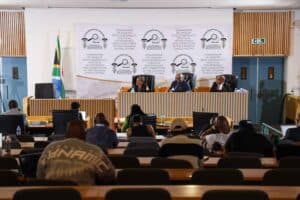'ANC disunity and opposition parties coming together to form a formidable coalition against the ruling party – to pass a motion of no confidence and an anti-ANC offensive for 2024 polls – can be strong factors.'

As parliament prepares to vote on the Section 89 independent panel report into Phala Phala, ANC MPs are expected to close ranks around President Cyril Ramaphosa by rejecting the narrative by retired chief justice Sandile Ngcobo.
This would give the embattled Ramaphosa a political lifeline to contest the party’s presidential race taking place this month, according to experts.
Ngcobo, who chaired the panel probing the burglary and theft of a large amount in US dollars on Ramaphosa’s game farm two years ago, found he had a case to answer – placing his ethical leadership into question, opening an avenue being exploited by his detractors in the run-up to the party’s all-important gathering and creating instability in markets.
Open ballot
Parliamentary spokesperson Moloto Mothapo confirmed MPs would vote in an open ballot following a debate on the Phala Phala report, making it possible for a voting pattern and the identity of lawmakers to be made public.
Predicting how the Phala Phala vote would swing, Professor Dirk Kotzé from the University of South Africa political science faculty, said the ANC parliamentary caucus had “a strong tradition to vote as a group and not allow for a deviation or a back-benching type of voting”.
NOW READ: ANC decides to back Ramaphosa, will vote against adopting Phala Phala report
Prediction
Except for known anti-Ramaphosa ANC MPs like Mervyn Dirks and Supra Mahumapelo, Kotzé said: “By far, the majority of ANC members will follow instructions of the party parliamentary caucus.”
“With parliament having confirmed a secret ballot will this time not be allowed, it will be impossible to deviate from the old ANC tradition of voting as a block.
Secret ballot resulted in true opinions
“I only recall one exception – the last motion of no confidence against former president Jacob Zuma which was conducted through a secret ballot – making it possible for people to vote according to their opinions.”
University of Pretoria politics lecturer Roland Henwood concurred, saying: “I expect the ANC to close ranks, support and protect President Ramaphosa.
“The ANC cannot afford to lose the initiative and allow opposition parties to decide or dictate the terms of the voting outcome.
“To a large extent, this will probably be a replay of the process that we saw with Jacob Zuma during opposition party-initiated parliamentary votes of no confidence, which were defeated by the ANC majority.
“In the case of Ramaphosa, the impact may be positive in the short term, signalling a level of stability and continuity. In the longer term, it may be as little as buying time for a different and largely undefined outcome for the ANC and, possibly, the country.”
Sceptical about Ramaphosa’s second-term chances as president, independent political analyst Sandile Swana said a possibility of many ANC MPs voting for the start of the impeachment process should not be ruled out due to internal conflicts.
Coalition
“ANC disunity and opposition parties coming together to form a formidable coalition against the ruling party – to pass a motion of no confidence and an anti-ANC offensive for 2024 polls – can be strong factors.
“However, there is also a high probability that the ANC will somehow succeed in opposing the panel report and a possible impeachment,” said Swana.
Change is not bad
Nelson Mandela University lecturer in political and conflict-resolution studies Ongama Mtimka said: “Given the party-centric nature of our parliamentary system, it is not necessarily a bad idea for the ANC to choose to change a leader following party processes rather than in parliament.
“It is the party that has to manage the processes of making sure there is another leader – for as long as we are in a dominant party system.
“The problem during the Zuma era was when the party shielded a president without there being a clear direction on how to resolve real issues that people are complaining about.
“We get worried when there is neither a process of recalling of a president within parliament, nor a party-based practice of changing leadership.”
ALSO READ: Ramaphosa’s fight back could pick apart Phala Phala panel’s ‘irrational’ errors






